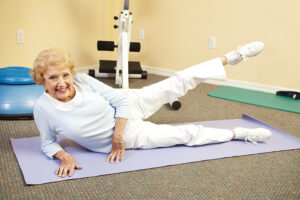What Seniors Should Know About Calorie Deficits and Weight Loss
March is National Nutrition Month and it’s a good time to look at some of the issues about nutrition and health that impact seniors. Being overweight is something that can make the medical conditions that your senior loved one has even worse, and it can make them more likely to develop other serious medical problems. These are things that you, your senior, and their home care providers should consider when preparing meals.

Home Care Midland Park NJ – What Seniors Should Know About Calorie Deficits and Weight Loss
For example, being overweight increases the risk that a senior will have a heart attack or a stroke. So it’s important for seniors that are overweight to lose weight. However, seniors can have trouble losing weight because exercise may be difficult for them. One option that seniors have to try and lose weight is to try a calorie deficit. But does that work? Is it safe? Here’s what you and your senior loved one should know:
What a Calorie Deficit Is
A calorie deficit is just a term for burning more calories than you take in each day. It means cutting back on calories in proportion to exercise. The theory behind a calorie deficit is that weight loss is just math. As long as someone is taking in fewer calories than they are burning each day they will start to lose weight. And while that’s great in theory it doesn’t always work like that. Not all calories are created equal.
Calorie Deficits Require Exercise Too and Home Care Aides can Oversee
The more exercise your senior loved one does the more calories they will burn. So exercise is going to be part of any weight-loss strategy. Even simple exercise like walking around the block is better than just sitting on the couch. A home care provider can help motivate your senior loved one to get moving. A home care provider can also help track your senior loved one’s exercise through the week to help figure out how many calories they are burning.
Ask A Doctor
Seniors should never start a diet or a new way of eating like a calorie deficit without consulting their doctor. If your senior loved one needs to lose weight make an appointment to talk to their doctor so that you and your senior loved one can get helpful advice that is tailored to your loved one’s specific medical situation and weight loss goals.
A Healthy Diet Is Always A Good Option
There’s no magic trick to losing weight. Seniors who are eating a healthy diet that is primarily made up of vegetables and fruits with some lean meats like chicken and fish and some whole grains are going to have an easier time losing weight no matter what. There are ways that seniors can cut calories without a full-calorie deficit like switching to low-calorie dressings, eating more vegetables, and using fats like butter sparingly. Even seniors who can’t do much exercise because they have limited mobility can benefit from eating a healthy diet. And other benefits come from a healthy diet too. Seniors should focus on being healthy and not just focus on weight loss.
Sources: https://www.ncbi.nlm.nih.gov/pmc/articles/PMC5026870/
https://www.webmd.com/diet/calorie-deficit
If you or a senior family member are considering hiring Home Care Services in Midland Park NJ, please contact the caring staff at Caring Solutions Home Care LLC. In-home senior care servicing Bergen & Passaic Counties. Call today at (973) 427-3553.
- How Senior Home Care Helps Seniors Live Alone Safely - July 17, 2024
- Make it Easier for Seniors to Transition to In-Home Care - July 8, 2024
- Why Your Senior Loved One Should Be Trying to Walk Every Day - June 20, 2024

